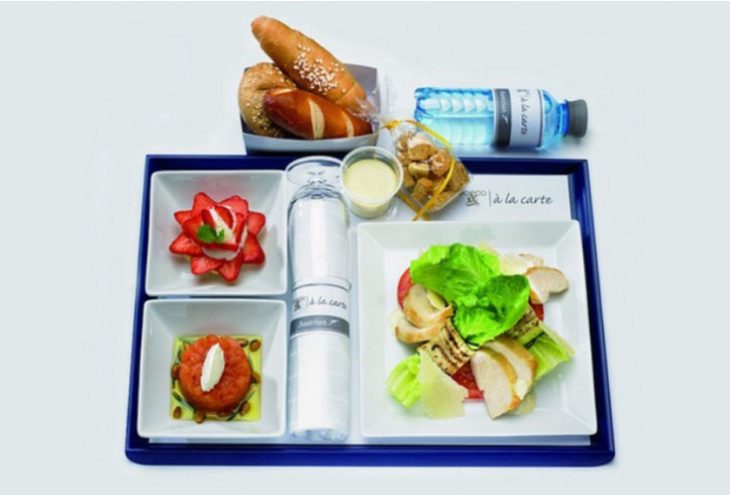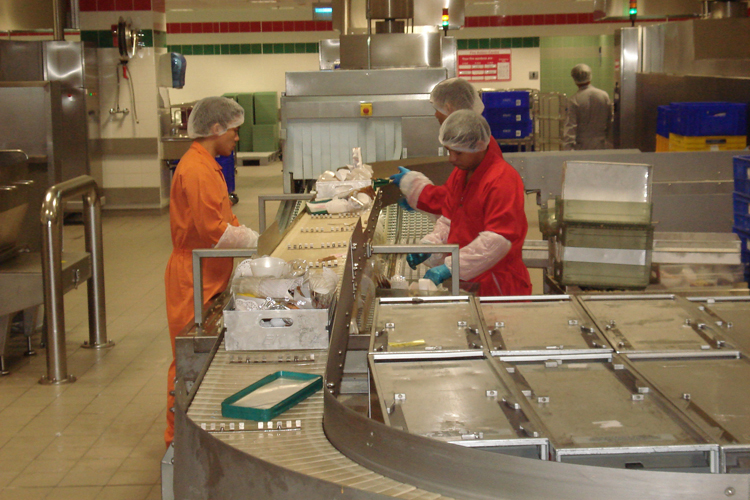New digital procedures promise to improve world travel catering. Last year airlines produced 5.2 million tons of waste - highlighting the fact that sustainable catering needs to be addressed. Could pre-ordering via an app reduce food waste? //by Victoria Wegmann
Regardless if you travel by plane, car or train - at some point you will become hungry, craving food. Many customers want their food in a special way like vegan, gluten-free, or they have intolerances. This is one of the reasons why smart travel food is becoming important. Food trends are not just going in the direction of living a vegetarian or vegan lifestyle, but also eating bio, regional, seasonal and with reduced plastic packaging. Last year airlines produced 5.2 million tons of waste, according to the International Air Transport Association, and by 2030 it is predicted to be over 10 million tons annually. This is what smart food is supposed to be about: being healthy and sustainable.
The idea of creating intelligent food is highly discussed, with a focus on how technical devices can help produce more in less time, reduce waste and produce healthier convenience food. An app for preordering the food could be one supportive gadget that reduces food waste.
Preordering via an app
Preordering from an airline’s home port, like the Vienna Airport, is already possible, but preordering via an app is on its way to becoming more popular. Airlines like Lufthansa, Singapore Airlines and Quanta’s Airlines are already enabling individuals to preorder via a smartphone from seven days to twelve hours before the flight.
Especially for frequent flyers, there is an opportunity to preorder food. If you have an online profile it’s easy to choose the meal, even one that is low-carb or lactose-free. But this only exists for airlines - trains and intercity buses don't have this option yet.
Dr. Birgit Jähnig, the nutritional science, home economics and chief editor for the journal Focus on Nutrition, supports this idea: "I personally think it makes a lot of sense to preorder meals via an app. I can imagine that it may reduce food waste when people can choose what they eat. For example, more and more people like to eat vegetarian dishes, or prefer low carb or high protein meals - if only available. In addition, growing numbers of people suffer from intolerances. They have a need to choose - if not there might remain nothing edible on their plate."
But every good idea has its disadvantages: on short flights, hot meals are replaced by sandwiches. The sandwich is pre-packed in plastic, making it more hygienic since no one can touch it and nothing can leak. Even on long-haul flights, it could become problematic if not everyone uses the app or changes their mind at short notice since there must always be enough food on board.
Michael Huhn, head of Overall Sales of the German company Unitechnik - a specialist for automated flight kitchens - is convinced that it is a step in the right direction: "I believe that this would be a good investment because it would be an improvement."
Sustainable and healthy Catering
According to Jähnig, convenience foods can, in principle, be healthy: "I often consider frozen products, such as plain frozen vegetables, to be richer in vitamins than fresh food that has been kept warm for hours in the supermarket or stock." The ecotrophologist believes that there isn´t such thing as "good" or "bad2 food. "I consider it an important contribution to sustainability – in catering and in normal life - that the ´raw materials´ are organically grown, seasonally harvested and freshly produced. As far as possible they should be local products that do not have long transport routes behind them,” states Jähnig.
For Laura Friedrichs, management assistant from the German hot meal production company Frankenberg, sustainability plays a major role: "Since we only produce frozen products that have a shelf life of up to 18 months and which doesn’t generate any daily waste, we have the advantage over cook-and-chill products that create daily waste. We also donate leftovers to the surrounding food banks." The family-owned company works with its own IT team to optimize workflows, and uses leftovers for employee catering and personal sales.
Catering companies such as LSG Sky Chefs or Gate Gourmet, however, could not be persuaded to provide any information for this article. This makes it difficult to say whether catering companies produce food sustainably.
Sustainability is not just about food
Flying is a much-loved way of traveling, but unfortunately not very sustainable. After the flight, packaging remnants have a tragic ending: they'll be swept away. For sustainable catering, it would be particularly important not to use disposable packaging but a recyclable one.
Huhn notes that one must differentiate between foodstuffs, since the term is very far-reaching: "Wine bottles that have not been uncorked, or even high-percentage alcohol bottles such as whiskeys served in 1st or business class, are returned under the strict supervision of the cabin staff to the bar cart. These items are reused in the next flight." Everything else in the cabin, even closed marmalades are thrown away according to Huhn. "That hurts."
Problem: Packaging waste
"Unfortunately, it is forbidden to give the food to food banks, personally there are always tears in my eyes when I see it," says Huhn. "The food can’t be recycled because the person who places the food on the market no longer has control over what has happened in the meantime, so the risk of liability is too great."
Even shrink-wrapped rolls and sealed yogurts are thrown away. Plastic cutlery itself is reused if it can be cleaned, but normally they simple plastic cutlery is ground away and returned to the materials cycle as part of normal plastic disposal.
This is the case all over the world, even in Dubai. Emirates Flight Catering has the largest air-kitchen in the world. In Dubai's air-kitchen there are several areas where cooking takes place and a great deal of attention is paid to hygiene. According to Michael Huhn, the flight kitchen places great importance on high-quality food, since star chefs precook them, and they offer a high degree of variety." The kitchen is huge and the food there is still portioned by hand, which looks funny, but is simply the most effective and fastest."
Little options to reduce waste:
Reducing packaging waste is not easy, as passengers are not necessarily willing to pay more money, but want it as qualitatively and cheaply as possible. One way to reduce packaging waste would be, for example, if the cabin crew were to draw from a large soup pot and fill the food on site. "However, this would require more cabin crew, considerable more time and it still needs a packaging so that the food does not drop from the plate," explains Huhn. "And the way we humans are currently thinking, I do not see any chance of reducing packaging waste."
It remains to be seen whether preordering will contribute to solving these problems. The food industry and catering enterprises have to react to needs of the customers. It might be that in the long run, customers refuse high-sugar, high-fat and high-salt foodstuffs that are not good for them. "I’m supporting the idea that catering services use more fresh, chilled or frozen products to serve healthy food to travellers. I really would love having an apple during a long-distance-flight – maybe other people would appreciate that too," Birgit Jähnig punctuated.
How to eat healthy by Dr Birgit Jähnig

Dr Birgit Jähnig, nutritional science and home economics and specialist editor for the journal “Focus on Nutrition”//Quelle: BLE Bonn
According to Dr Birgit Jähnig there isn´t such thing as "good" or "bad" food. It all depends on your individual decisions:
• if you really like what you eat,
• if you enjoy your food,
• if you listen to your body whether the food is wholesome for you,
• if you finish your meal when you feel full and
• if you only restart eating when you feel hungry again.
All this sounds much easier than it is in everyday life. Nevertheless, give it a chance!
Besides these ideas of being attentive and careful with your body, Birgit Jähnig considers important that vegetables and fruits are organically grown, seasonally harvested and freshly produced. As far as possible they should be local products. But: Local products vary all over the globe! For this and because everybody is his or her own food expert there are as many ideas about what "healthy food" is than there are people in the world.
Despite the multitude of opinions about the "right" way to eat, international research agree that a Mediterranean diet can do good in preventing chronical diseases. For this:
• Have lots of vegetables and fruits
• Choose legumes and nuts
• Have moderate portions of poultry, (sea) fish and meat
• Have moderate amounts of milk, milky products and cheese
• Use high-quality oils e. g. olive oil, rapeseed oil and nut oils
• Reduce your consumption of sugar, sweets and sugary soft drinks
How exactly does waste disposal work in flight kitchens?
The contents of the carts are the responsibility of the air kitchen, which passes through the carts of several airlines. Each airline has its own carts, appropriate cutlery for each cabin (economy, business, 1st class) and a menu plan that is put together for each flight. The carts, tablets and even cup sizes are all standardised. And if you know how many passengers are booked on a flight, an appropriate selection of food and resources will be provided.
Steps for waste disposal:
1. When unloaded from the plane by high loaders, the carts are taken into the inbound area of the kitchen, where they remain, sometimes up to several hundreds, until the doors are opened, and special employees take out the trays, on which the dishes and all the remains lie.
2. The waste is then separated, after which everything that is aluminium, such as the cover of the heated food is specially disposed of, the dishes are tilted empty and the leftover food is pushed into appropriate containers.
3. The empty dishes are put into the washing machines, the food leftovers are sucked off above the "combustor" and disposed of in a large organic waste bin, which is then also disposed of. Whole liquids are emptied again, leftover drinks and the rest, like the jam jars and butter jars are thrown away.
Teaserbild: Clean and healthy travel food almost plastic free- this is a wish of customers and the travel industry// Quelle: Flickr
Die Autorin

Victoria Wegmann
















